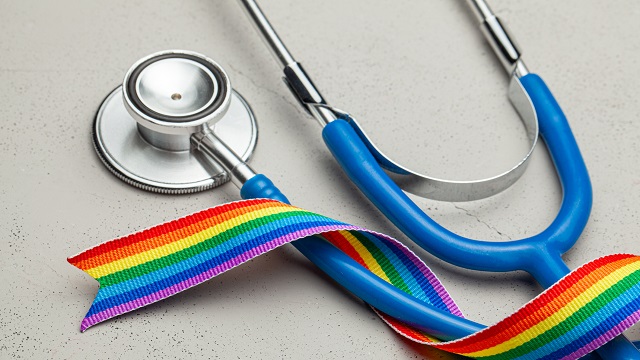
For many people in the LGBTQ2+ community, accessing medical services can bring unexpected challenges, from not seeing themselves represented in posters and health literature, to being outright refused service.
"Many patients who identify under the rainbow flag in some way have had experiences where either they didn't feel welcome or included, or were actively discriminated against in medical situations," says Julia Chronopoulos, assistant clinical professor in the Department of Family Medicine and the University of Alberta's Sexuality and Gender Advocacy physician mentor. "There is a lot of data that supports the fact that people are not necessarily accessing the health care they need because of this lack of comfort, lack of knowledge or overt hostility."
"It can lead people to feel that the medical system is not a place where they belong, that it's not their medical home."
The challenges faced by marginalized communities are what inspired Chronopoulos to help launch the Rainbow Clinic, a collaborative program between the U of A and MacEwan University, housed at the MacEwan University Health Centre in downtown Edmonton.
"The clinic is meant to be a specific safe place and safe clinic for people who identify as being sexually or gender diverse," Chronopoulos says. "That includes things like standard family practice, screening and medical management, as well as aspects around trans health, medical transitions and support for transition."
While many doctors may say they have no issue treating members of the LGBTQ2+ community, Chronopoulos points out that there are many institutionalized cis-hetero monogamous norms-in the practice and teaching of medicine as well as in society at large-that filter down into the education of medical trainees. For example, a doctor seeing a patient for a prenatal visit may ask, "What does your husband do?," assuming that the patient is both married and heterosexual. On the extreme end, a transgender patient may get turned away from care because a health-care professional might believe they don't know enough about transgender people to provide them with health care.
Part of the solution is increasing health professionals' exposure-both medically and socially-to a wide range of diverse health issues, Chronopoulos says.
"If a physician hasn't had a lot of medical exposure to LGBTQ2+ patients, they might not feel that they're aware of the key health concerns that might be present in one population versus another," she says. "So part of what I'm doing is trying to increase people's exposure to LGBTQ2+ care, and their confidence in being able to provide it."
Inclusive Health Conference
Learn more about LGBTQ2+ health
The Inclusive Health Conference returns for its seventh year on March 21, 2020, hosted by the Sexuality and Gender Advocacy Committee of the university's Medical Students' Association.
Date: March 21, 2020
Time: 8 a.m. - 5 p.m.
Location: Lister Hall, University of Alberta, Edmonton.
Open to all health-care professionals, this year's conference also features keynote speaker Ted Jablonski, a Calgary family physician who has been working with transgender patients for over a decade. The co-author of a new set of guidelines for transgender health care, Jablonski will speak about the challenges of transgender health care in Alberta.
Other topics to be addressed at the conference include the province's socio-political climate for LGBTQ2+ advocates, trans mental health in the workplace and a look at how Alberta Health Services is working to build a more inclusive health system in the province.
Chronopoulos' talk will focus on how physicians can make their practices more inclusive, not just after identifying a patient that is part of the LGBTQ2+ community, but every day.
"Most of the things I recommend are simple switches, but aren't easy," she says. "For example, don't talk about 'women' getting pregnant, talk about 'people' getting pregnant. That sounds like a simple change, but it asks a lot of a person to change the entire way they have learned and thought throughout their practice."
Though she admits change is challenging, Chronopoulos believes it is worth it, not only for patients, but for health-care professionals as well.
"In a lot of ways, this field of medicine can be really, really rewarding in ways that other fields aren't," she says. "When you can make a positive difference in the life of someone who has been having trouble accessing health care that is safe and comfortable for them, that adds another level of reward to our jobs that is not always inherent in the work that we're doing day to day."